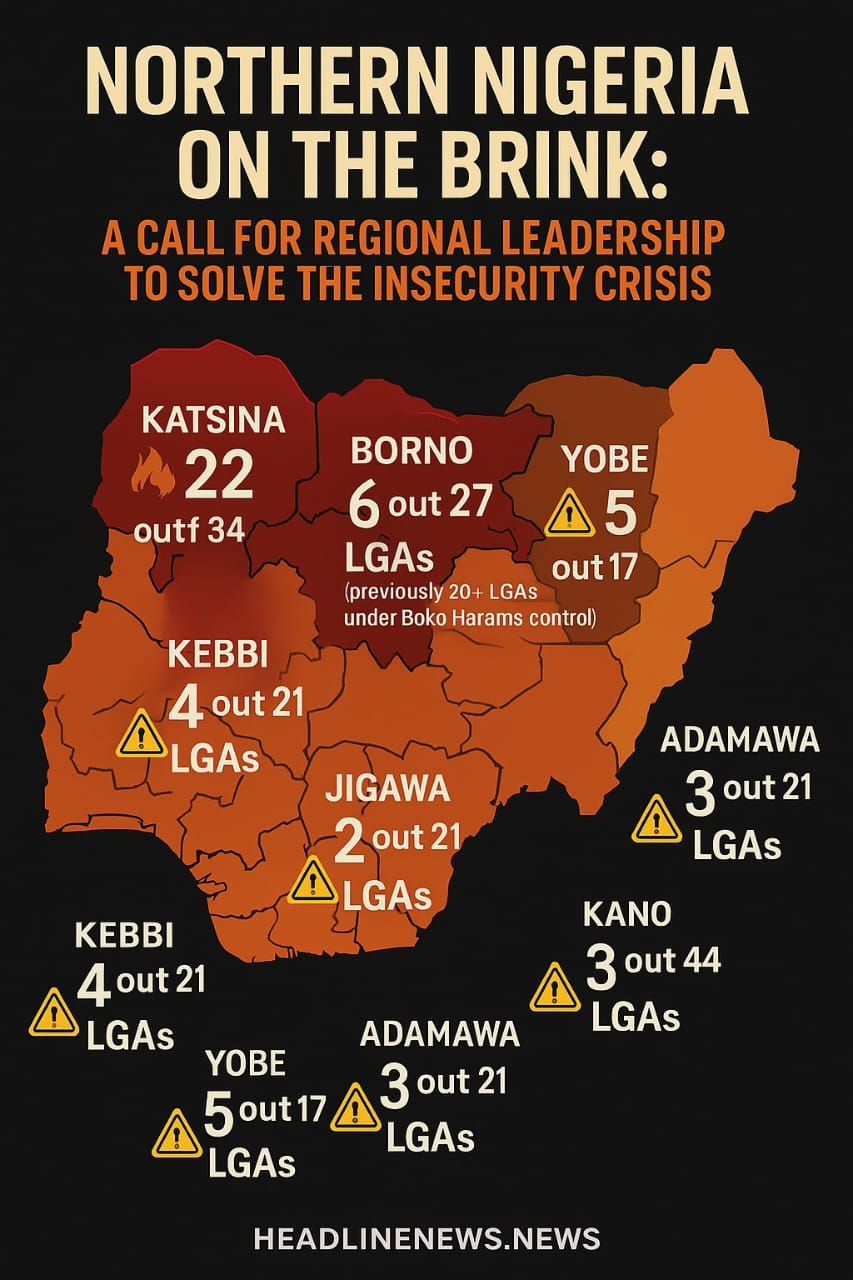“Northern Nigeria on the Brink: A Call for Regional Leadership to Solve the Insecurity Crisis”
By HeadlineNews.News Investigative Desk
As Nigeria continues to battle a myriad of security challenges, no region has borne the brunt more than the North. From Boko Haram’s insurgency in the Northeast to banditry, kidnapping, and terrorism across the Northwest and North Central, the crisis has reached existential proportions. Yet, the most glaring challenge is not only the scale of the violence but the silence—or inaction—of Northern political, traditional, and religious leadership.
“This is a Northern problem, and Northern stakeholders must rise to solve it,” a senior Northern elder recently declared in a frank interview. His words have echoed widely across Northern media and civil society. He questioned why President Tinubu, from the Southwest, should be expected to solve an internal security collapse that President Buhari, a Northerner from Katsina, could not address despite eight years in office and full military backing.

Insecurity: By the Numbers
Katsina State: Of the 34 Local Government Areas (LGAs), 22 are under siege by bandits and terrorists, according to local sources and security briefs. The situation was so dire that former President Buhari relocated from Daura to Kaduna in 2025 due to threats in his hometown.
Borno State: At its peak, Boko Haram controlled over 20 LGAs. Though efforts by the military have reclaimed most areas, insurgents still hold sway in parts of Gwoza, Marte, and Abadam, disrupting farming, education, and humanitarian access.
Kaduna State: Once the industrial heart of the North, it has become a corridor of terror. As of 2023, over 1,200 schoolchildren and villagers were kidnapped in the state. Southern Kaduna remains a hotspot for ethnic killings and reprisal attacks.
Yobe State: Continues to face threats in areas like Gujba, Gulani, and Geidam, with sporadic Boko Haram attacks despite relative military presence.
Kebbi & Jigawa: Though less volatile, Kebbi’s Danko-Wasagu and Zuru axis face increasing attacks from fleeing bandits. Jigawa, a border state, is experiencing cross-border influxes of armed criminals from Niger Republic.
Adamawa: While more stable, Madagali LGA and mountainous border areas still see remnants of Boko Haram cells.
Kano State: Despite being considered relatively secure, Kano’s rural fringes face the threat of infiltration, while urban crime is on the rise. Youth unemployment and radicalization remain ticking time bombs.

Analysis: Why Buhari Failed and Why Tinubu Might Too
Many believed that electing a president from the North would bring homegrown solutions. Instead, during Buhari’s administration, the number of displaced persons in the North skyrocketed to over 3 million, and terrorist cells expanded their territories across five geopolitical zones.
Despite record defense budgets—₦4.6 trillion between 2015 and 2022—the military has been unable to defeat what are essentially locally-based criminal networks.
“This insurgency has defied military solutions because it is internal,” noted retired General Abdulrasaq Dambatta. “We know them. They are from our communities. It’s not a war—it’s a breakdown of leadership and social order.”

Shehu Sani and Other Voices of Conscience
Senator Shehu Sani, a vocal critic of both the insurgency and the leadership vacuum in the North, recently called on Fulani youth to “reclaim the dignity of their heritage” by disassociating from criminal gangs masquerading as ethnic champions.
“You can’t defend culture through violence. You’re giving the Fulani name a criminal association. This must stop, and elders must take charge,” he urged at a recent forum in Abuja.

The Way Forward
1. Northern Security Summit: A regional summit of all Northern governors, traditional rulers, and security experts is urgently needed to chart a people-led solution.
2. Local Vigilantes with Oversight: Formalize, train, and monitor local defense groups like the Yan Sakai under state ministries to avoid ethnic profiling and revenge attacks.
3. Truth and Reconciliation Framework: Address the root causes—land disputes, herder-farmer crises, poverty, and radicalization—through open dialogue and justice mechanisms.
4. Education and Youth Employment: Northern Nigeria remains the region with the lowest literacy and highest out-of-school children rate (10.5 million). Solving insecurity without solving ignorance is impossible.
5. Community Accountability: Elders, emirs, imams, and youth leaders must identify, isolate, and de-legitimize criminal elements in their domains.

Conclusion: Northern Nigeria Must Save Itself
The time for blame games is over. Northerners must stop looking to Abuja and instead look within. The crisis did not start with President Tinubu, and it will not end with him. Security, at this point, is not about ethnicity or religion—it is about survival.
If the North is to remain a relevant political bloc and economic partner in Nigeria’s future, it must secure itself. The road to peace must be paved from within.
Headlinenews.news investigative team.




